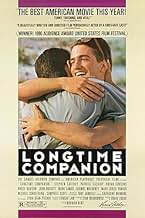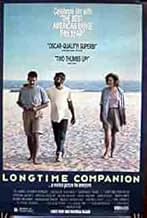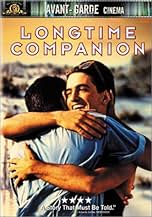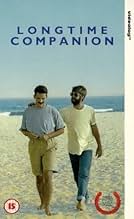VALUTAZIONE IMDb
7,5/10
6383
LA TUA VALUTAZIONE
L'emergere e la devastazione dell'epidemia di AIDS è cronaca nella vita di diversi uomini gay che hanno vissuto durante gli anni '80.L'emergere e la devastazione dell'epidemia di AIDS è cronaca nella vita di diversi uomini gay che hanno vissuto durante gli anni '80.L'emergere e la devastazione dell'epidemia di AIDS è cronaca nella vita di diversi uomini gay che hanno vissuto durante gli anni '80.
- Regia
- Sceneggiatura
- Star
- Candidato a 1 Oscar
- 6 vittorie e 6 candidature totali
Recensioni in evidenza
Longtime Companion chronicles the lives of a group of gay men during the 1980s. The focus of the film is AIDS, unknown to the men when the film opens in 1981, but by the end of the story in 1989, it has become the central defining event in the lives of the survivors. Shot in almost documentary style the story is told almost matter-of-factly. But the reality of the lives of the men in the story is not matter-of-fact; they are dying and dying in the prime of their lives. It's heart-rending. In this, the movie succeeds very well, raising awareness of the effects of AIDS, and putting a human face to its victims.
A landmark film, not only in that it is the first film to deal with the AIDS crisis, but also in its portrayal of gay men and their friends. Sitting on the cusp between earlier depictions of gays as murderous or suicidal and later caricatures of funny, sexless "best friends", the men shown here are very real and very honest in their decade long struggle with death and illness. I defy you to watch Bruce Davison's heartbreaking farewell speech and not be choked up on some level of emotion. And Mary Louise Parker add a special touche. This movie has arguably the greatest final scene in gay cinema.
The title is the newspaper obituary euphemism for a gay lover, and yet another discreet but frustrating reminder of how mainstream heterosexual society avoids confronting the AIDS epidemic. In an effort perhaps to offset public ignorance, Norman René's film of the same name almost resembles an AIDS awareness primer, dramatizing the deadly progress of the disease through the gay community since the summer of 1981, when 'safe sex' merely meant anything goes, but don't get caught. Like other American Playhouse productions the film is simple, unpretentious, and no less rewarding for being so straightforward. René and writer Craig Lucas have wisely resisted the temptation to make a 'Love Story'-style terminal illness melodrama, concentrating instead on the bittersweet pain and bravery of awkward hospital visitations and quiet deathbed encounters. Only the forced optimism of the final daydream rings false, unavoidably since the epidemic itself (still) has yet to be resolved by anything resembling a cure. The balance of the film is simply too honest to support such sentimental wish-fulfillment fantasies.
I saw this film one night on my local PBS station not knowing what it was about. When the film opens on a crowded disco soundtracked Fire Island (1980) and I realized it was a gay themed film I was about to turn it off being a hetero male, I figured nothing here to relate too. WRONG. I stuck with the film and probably have to rate this as one of my top 10 movies ever. WOW did this film floor me! It follows a group of gay friends and lovers (and a hetero gal pal)through the AIDS plagued 80's decade. This film is truly written with insight and compassion. I found all the characters interesting and realistic with the actors portraying them excellently as well (especially Campbell Scott and Bruce Davidson). The scene with Davidson bringing his lover to his death is heartfelt and emotional but the scene at the end with the 3 survivors walking now on a silent deserted Fire Island beach as all their friends(and others) who died from AIDS milling about as they remembered them brought a lot of tears to my eyes. It is how all of us as humans try to remember those we love who have passed. I recommend this movie to all people both gay and straight because it is a film that transcends these labels and speaks to us as just humans,all in this mystery called life, as one.
Blondie's hit record opens this early AIDS film, a kneejerk reaction to the hysteria that was happening in the world in the wake of so many deaths from what was still viewed as 'the gay plague'.
'Longtime Companion' centres on a group of friends who are affected by AIDS in various different ways - two are victims of the disease, while others survive to remember their friends with affection. There are one or two stereotypes here (the camp Fuzzy, who mimes to disco records), but in the main the characters are played with sensitivity (and a degree of humour): Bruce Davison, Mark Lamos, and Campbell Scott stand out from a good cast.
I particularly liked the moving and celebratory ending, a surreal segue which brings everyone together in a huge, joyous beach party where everyone is alive, in love, and together. This single scene says more about the effects of the AIDS epidemic than many other right-on scenes from more traditional films.
'Longtime Companion' centres on a group of friends who are affected by AIDS in various different ways - two are victims of the disease, while others survive to remember their friends with affection. There are one or two stereotypes here (the camp Fuzzy, who mimes to disco records), but in the main the characters are played with sensitivity (and a degree of humour): Bruce Davison, Mark Lamos, and Campbell Scott stand out from a good cast.
I particularly liked the moving and celebratory ending, a surreal segue which brings everyone together in a huge, joyous beach party where everyone is alive, in love, and together. This single scene says more about the effects of the AIDS epidemic than many other right-on scenes from more traditional films.
Lo sapevi?
- QuizThe title refers to the only way that newspapers at the time would allow a gay man's lover to be listed in an obituary.
I più visti
Accedi per valutare e creare un elenco di titoli salvati per ottenere consigli personalizzati
Dettagli
- Data di uscita
- Paese di origine
- Lingua
- Celebre anche come
- Longtime Companion
- Luoghi delle riprese
- Aziende produttrici
- Vedi altri crediti dell’azienda su IMDbPro
Botteghino
- Budget
- 3.000.000 USD (previsto)
- Lordo Stati Uniti e Canada
- 4.609.953 USD
- Fine settimana di apertura Stati Uniti e Canada
- 50.525 USD
- 13 mag 1990
- Lordo in tutto il mondo
- 4.609.953 USD
Contribuisci a questa pagina
Suggerisci una modifica o aggiungi i contenuti mancanti

Divario superiore
By what name was Che mi dici di Willy? (1989) officially released in India in English?
Rispondi

































